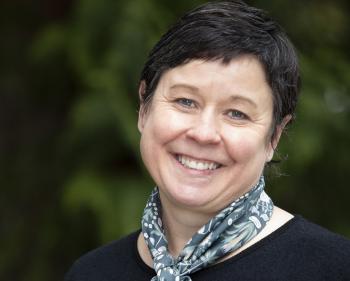Image Caption
Summary
Local Journalism Initiative Reporter
Windspeaker.com
Dr. Deborah Saucier is usually not lost for words.
But the Métis president of Vancouver Island University (VIU) was virtually speechless when she received a recent call from Tabatha Bull, president and CEO of the Canadian Council for Aboriginal Business (CCAB).
Bull contacted Saucier, who is also VIU’s vice-chancellor, to inform her that she had been selected as the 2020 recipient for the Indigenous Women in Leadership Award.
The award is presented by the CCAB and the TD Bank Group. The fact Saucier is this year’s winner was officially announced this past Friday.
“I think if there had been a camera around when Tabatha Bull called me to tell me I had won the award, the absolute shock would have been obvious,” Saucier said.
“I was a wreck for the rest of the call,” Saucier said.
Because of the pandemic, Saucier will be presented with her award during the CCAB’s virtual Business Recovery Forum, scheduled for Sept. 16. This conference will allow people to exchange ideas, collaborate and network in the hopes of rebuilding businesses and the economy.
Saucier said the reason she was caught off guard by the news she would be receiving a prestigious leadership award is because “I had no idea anybody had any idea what I had been doing,” she said.
She’s only been with the Nanaimo-based VIU since July 2019. One of her priorities at the school is to work towards closing the education gap for Indigenous people so they can excel during their post-secondary careers.
Saucier has also been a long-time advocate of having more women involved in the STEM (Science, Technology, Engineering and Mathematics) fields.
Before coming to VIU, Saucier spent three years serving as the president of Edmonton’s MacEwan University.
During her time at MacEwan, Saucier did her best to include both the United Nations Declaration on the Rights of Indigenous People and the Truth and Reconciliation Commission’s calls to action in the school’s decision making.
Saucier was responsible for initiating and implementing not only policy but physical changes on MacEwan’s campus to guarantee Indigenous students saw their heritage displayed in visible areas.
And for six years before that, Saucier was the provost and academic vice-president at the University of Ontario Institute of Technology, located in Oshawa, Ont.
Besides being a respected administrator, Saucier is also an accomplished neuroscientist.
A highlight was serving as the Canadian Research Chair in Neuroscience at the University of Lethbridge from 2006 to 2011.
Saucier was proud of that posting as it had traditionally been held by white males.
“I’m the only one who became a university president,” Saucier said.
Bull believes Saucier deserves full marks for the leadership award she will receive.
“The role of Indigenous women in traditional life has long been one of leadership and strength, and Dr. Saucier completely embodies this,” Bull said.
Bull is also impressed with Saucier’s take-charge style.
“Dr. Saucier’s determination to bring the United Nations Declaration on the Rights of Indigenous People and the Truth and Reconciliation Commission’s calls to action to the forefront of decision-making is a testament to her values and her strength of character,” Bull said.
Though she’s from Saskatoon, Saucier began her own post-secondary academic journey on Vancouver Island.
For starters, she earned an International Baccalaureate diploma from Lester B. Pearson United World College of the Pacific in Victoria.
She then received her bachelor’s and master’s degrees in psychology from the University of Victoria.
Saucier obtained her PhD in psychology from Western University in London, Ont.
Afterwards she worked as a psychology professor and researcher.
Saucier, who accepted a five-year term to become VIU’s president, has plenty she would like to accomplish.
“I want to dismantle the barriers that stop Indigenous Canadians from going to university,” she said. “For me, going to university has given me a great life.”
About 10 per cent of VIU’s students each year are Indigenous.
While Saucier would love to see those numbers increase, she is concerned the opposite might happen.
“I’m very concerned about the huge digital divide in Canada,” she said. “And I’m actually concerned about what the pandemic is showing us about our society and who gets to go to university.”
Saucier is worried that since the majority of post-secondary schools will only be offering online classes to start the 2020-21 academic year, many Indigenous students who are from remote communities with subpar communications will be left behind.
Learning online can be difficult or impossible without an adequate internet service. Saucier added accessing classes via a cell phone is not a viable option since some will not have reliable phones or be in a position to afford the data necessary.
“There will be challenges for remote learning until we have a cure or vaccine for this disease,” Saucier said.
Local Journalism Initiative Reporters are supported by a financial contribution made by the Government of Canada.

